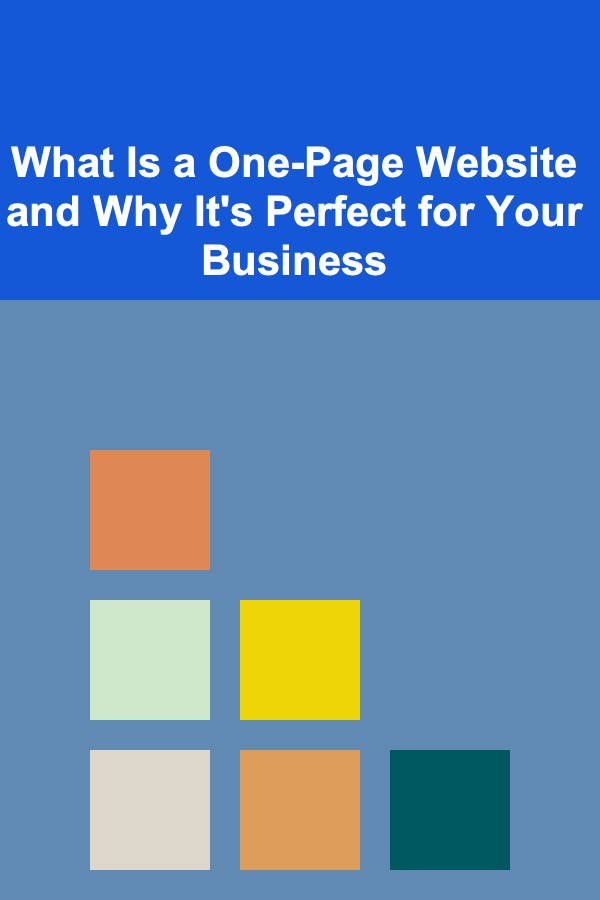
What Is a One-Page Website and Why It's Perfect for Your Business
ebook include PDF & Audio bundle (Micro Guide)
$12.99$9.99
Limited Time Offer! Order within the next:

In today's fast-paced digital world, the way businesses present themselves online is essential to their success. One of the most innovative and efficient website designs that has gained popularity in recent years is the one-page website. As businesses strive for streamlined, user-friendly experiences that engage visitors from start to finish, the one-page website offers a compelling solution. But what exactly is a one-page website, and why is it the perfect fit for your business?
This article explores the concept of a one-page website, its benefits, and why it could be the ideal choice for many businesses, regardless of size, industry, or goals.
What Is a One-Page Website?
A one-page website is exactly what it sounds like: a website that consists of a single, scrollable page of content. Unlike traditional websites that break down their information across multiple pages (like "About Us," "Services," "Contact," etc.), all the information on a one-page website is displayed on a single page that visitors can scroll through to access the various sections.
Despite being compact, one-page websites can contain everything a business needs to convey its message: from an introduction to the business, a showcase of products or services, customer testimonials, contact forms, and even a blog section. These elements are organized in a logical, easy-to-follow structure that guides visitors through the site.
The Core Characteristics of a One-Page Website:
- Single-page structure -- All content is confined to a single page, usually with a long-scroll design.
- Smooth scrolling -- When a user clicks on links or scrolls, they are seamlessly guided to the relevant section of the page.
- Visually appealing design -- The design is focused on making a strong visual impact, with elements such as high-quality images, videos, and animations.
- Simplified navigation -- Instead of multiple menus or sub-pages, navigation often consists of a sticky header with anchor links or a simple menu to scroll through sections.
- Compact and concise content -- Since space is limited, content is typically brief and focused, providing only the most important information.
The Rise of One-Page Websites
Historically, businesses built multi-page websites with a separate page for each service, product, or piece of information. These sites were often complex, requiring multiple levels of navigation. However, as mobile usage surged, particularly with the rise of smartphones and tablets, websites had to become more mobile-friendly. This led to a trend toward responsive web design and a shift towards simplified, more user-friendly websites.
One-page websites have emerged as a natural evolution in this trend, offering a cleaner, faster, and more engaging user experience. Mobile users especially benefit from these designs, as they do not need to navigate between various pages or wait for new pages to load. Instead, users can scroll through everything from the homepage to the "About Us" section to the call-to-action (CTA) without interruption.
Why Is a One-Page Website Perfect for Your Business?
1. Simplicity and Focus
One of the most significant advantages of a one-page website is its simplicity. Because everything is contained within a single page, there is no need for complex menus, sub-navigation, or multiple layers of information. This streamlined approach means you can focus your message and showcase your business in a clear, concise way.
By eliminating distractions, you can ensure that your visitors stay focused on your primary goals---whether that's learning more about your product or service, signing up for a newsletter, or making a purchase. This clarity of message is particularly beneficial for small businesses and startups, which need to make a strong, immediate impact.
2. Mobile-Friendly and Responsive Design
As mentioned earlier, one-page websites are inherently more mobile-friendly. Since the content is presented on a single page, users can easily scroll through it on their smartphones without having to navigate through multiple pages. This reduces the friction that often occurs with multi-page sites, such as loading times, cumbersome navigation, and the need to zoom in on small text.
With more than half of global web traffic now coming from mobile devices, optimizing for mobile use is crucial. A well-designed one-page website can ensure that your business is accessible to the growing number of mobile users in a way that feels natural and seamless.
3. Improved User Experience
A great user experience (UX) is essential to any website's success. One-page websites are often better than multi-page websites in this respect because they provide a smooth, uninterrupted browsing experience. Visitors can easily scan the page and find the information they're looking for in a matter of seconds. There's no need to click through several pages or wait for content to load, which can be a turnoff for visitors.
The scrolling design also provides a narrative-like flow, leading users through the page in a way that feels natural and engaging. From top to bottom, they can be introduced to your business, its services, testimonials, and more, making it easy to guide them to the action you want them to take.
4. Faster Load Times
Load time is an essential factor in the success of any website. Research has shown that websites with slow load times experience higher bounce rates and lower conversion rates. With a one-page website, there's only one page to load, which significantly reduces the time it takes to load content compared to multi-page websites.
Since all the content is on a single page, the browser does not need to load additional pages or assets, resulting in a faster, more responsive experience. Faster load times improve user satisfaction and help with SEO, as search engines like Google favor websites that provide a smooth, fast user experience.
5. SEO Benefits
While multi-page websites often have multiple pages to optimize for SEO, one-page websites have their own set of SEO benefits. Since all content is contained on a single page, it's easier to implement a coherent SEO strategy. You can optimize each section of the page for specific keywords, ensuring that all of your content is relevant to search queries.
Moreover, one-page websites tend to have fewer bounce rates, as visitors typically scroll down the page to explore the full content. This increased engagement sends positive signals to search engines, which can improve your website's ranking in search results.
6. Cost-Effective and Easy to Maintain
Building and maintaining a one-page website is generally more cost-effective than creating a large, multi-page site. The design process for a one-page website is often simpler and faster, as there are fewer pages to create and optimize. This means that businesses can launch their website quickly without significant upfront costs.
Additionally, updating and maintaining a one-page website is much easier and less time-consuming. With fewer pages to manage, businesses can quickly implement changes, make content updates, and adjust their messaging without the need for complex redesigns.
7. Perfect for Landing Pages and Marketing Campaigns
One-page websites are often used as landing pages for marketing campaigns, product launches, or special promotions. Their simplicity and clear call-to-action (CTA) make them ideal for driving conversions. Instead of having multiple pages that distract visitors, a one-page website focuses entirely on the goal at hand---whether it's collecting email addresses, selling a product, or encouraging sign-ups.
By consolidating all relevant information on a single page, you can create a seamless journey for users, reducing the friction between seeing the offer and taking action.
8. Increased Conversion Rates
Because one-page websites are focused on driving a single action, they often see higher conversion rates compared to traditional websites. Since visitors don't have to navigate through multiple pages, there is less chance for them to lose focus or be distracted by irrelevant information. Everything is laid out in front of them in a simple, clear manner.
The design of a one-page website encourages users to follow a predetermined path. With strategically placed calls to action (CTA) and well-organized sections, it's easier to guide visitors towards taking the desired action---whether that's signing up for a service, purchasing a product, or filling out a contact form.
9. Branding and Visual Appeal
A one-page website allows businesses to focus on creating a visually compelling experience that communicates their brand identity. With the entire website on one page, you can design it to have a cohesive visual aesthetic that aligns with your brand's values, colors, and tone. High-quality images, videos, animations, and typography can all work together to create an immersive experience that leaves a lasting impression.
10. Ideal for Small and Medium Businesses
For small and medium-sized businesses (SMBs), a one-page website is an ideal solution. These businesses often lack the resources to create and maintain large, complex websites. A one-page website allows them to make a strong impact with limited resources, delivering all the essential information in a simple, digestible format. Whether you're a freelancer, a local restaurant, or a startup tech company, a one-page website can help establish your online presence with minimal effort.
Conclusion
In today's competitive digital world, businesses must focus on providing a seamless, user-friendly online experience. One-page websites offer an ideal solution for companies looking to simplify their digital presence while maximizing impact. With their streamlined design, fast load times, mobile responsiveness, and ability to focus user attention, one-page websites are perfect for businesses of all sizes and industries.
Whether you're launching a new business, promoting a product, or running a marketing campaign, a one-page website can provide the simplicity, focus, and efficiency your business needs to succeed in the digital age. If you're looking for a cost-effective, visually appealing, and high-converting website design, the one-page website might be the perfect choice for you.

Geopolitics: Mapping the Complexities of Global Power
Read More
How to Build a Home Security System for Less Than \\$100
Read More
How to Inspect and Maintain Your Home's Attic for Ventilation
Read More
How to Plan a Decorating Schedule for Stress-Free Holidays
Read More
The Ultimate Guide to Saving on Household Cleaning Products
Read More
What Are the Best Furniture Choices for Multi-Functional Spaces?
Read MoreOther Products

Geopolitics: Mapping the Complexities of Global Power
Read More
How to Build a Home Security System for Less Than \\$100
Read More
How to Inspect and Maintain Your Home's Attic for Ventilation
Read More
How to Plan a Decorating Schedule for Stress-Free Holidays
Read More
The Ultimate Guide to Saving on Household Cleaning Products
Read More